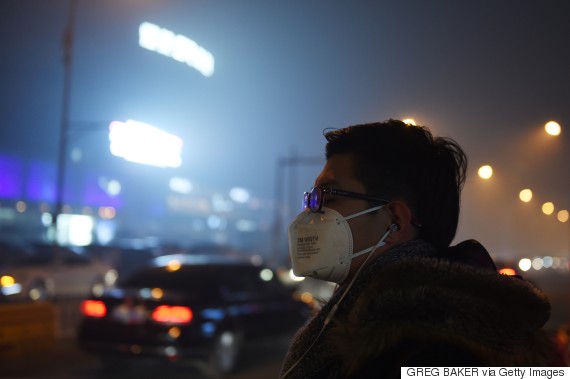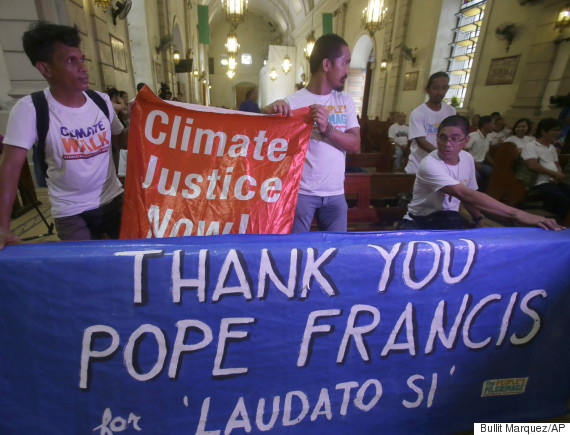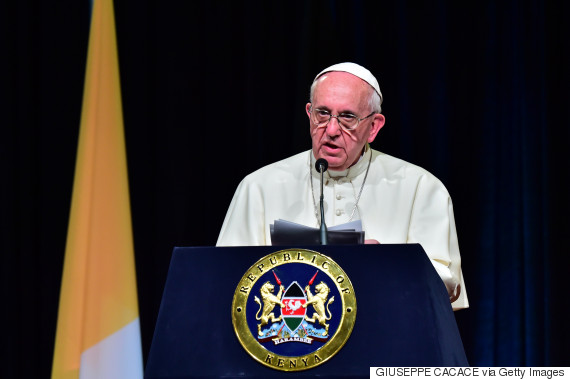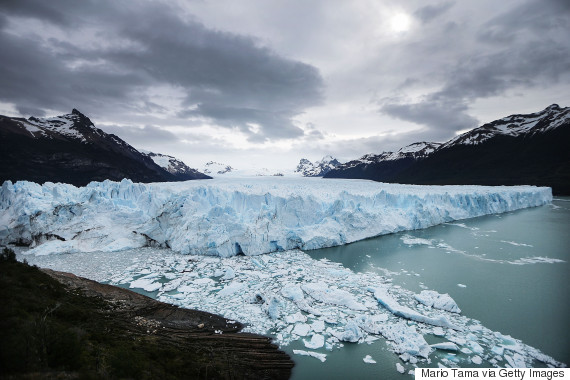
MELBOURNE, Australia -- Politics matters. Public policy matters. And the ethical judgments that inform public policy priorities also matter.
My first purpose here is to articulate an ethical approach for Christians and the Christian church to engage governments on major matters of politics and public policy, within the robust framework of a secular state. My second purpose is to apply this approach to the politics and policy of climate change as the critical 21st Conference of the Parties commences in Paris.
Now that the Paris summit on climate change is upon us, we must make judgments about the proper stewardship of the planet to ensure basic intergenerational justice for those who follow us, rather than a view that the science is unclear, the future can look after itself, and that technology, if necessary, will solve all.
Noble aspirations, in the absence of an effective machinery of government to translate aspiration into measurable action, is, to paraphrase Saint Paul, a clanging cymbal and a sounding gong.
These are all profoundly ethical judgments. They imbed judgments about what is right and wrong, about what is better or worse, about what should have priority, and what should not. Anyone who claims in making policy judgments they are doing so oblivious to ethical considerations, and instead are simply acting on a simple, "value-free" premise of "common sense," is engaged in deep self-delusion. Consciously or not, all our views are shaped by a vast array of ethical assumptions.
That does not mean that policy logic does not enter the equation. It must. Core questions such as "will a given policy course of action produce the results that are sought, or will it produce other unintended consequences?" "what will it cost?" and "can it be funded within the parameters of necessary fiscal discipline?" must all be asked and answered. In fact ethics and logic must be equal partners in the public policy process. One is deficient without the other. Noble aspirations, in the absence of an effective machinery of government to translate aspiration into measurable action, is, to paraphrase Saint Paul, a clanging cymbal and a sounding gong.
Ethical considerations should, however, be our starting point. The question arises, therefore, as to how in political life ethical judgments are to be formed, and how are they to be argued in the public square, and in the case of what is called "Christian ethics," how are these to be reconciled within the legitimately secular framework of contemporary democratic politics.
Faith, Ethics and Public Policy in a Secular Order
Rowan Williams has sought to address these questions in a collection of essays recently collated in a book entitled "Faith in the Public Square."
He wrestles with the core question of whether it is legitimate for any person in a secular state to articulate a policy position grounded in religious faith, rather than arguing that proposition in exclusively secular terms.
While it may be seen as an unwelcome view among the community of faith, secularism, in my strongest personal view, is a necessary precondition for modern political discourse. We are all familiar with the multiple abuses of religious authority, Catholic or Protestant, throughout Western history when a particular religious orthodoxy has been preferred by the political authority of the time. The often bloody history of the institutional church over 18 centuries, their Muslim counterparts over 14 centuries, and more recently between Catholics and Protestants in the centuries following the Reformation of 1517, provide a resounding case for a secular state as the lesser of many evils -- a place where propositions can be advanced and argued without recourse to any claims of higher revelation, or recourse to the coercive powers of baser politics in the name of God.

Williams argues that there are two forms of secularism in the 21st century: what he calls "programmatic secularism" as opposed to "procedural secularism." The former he defines as:
...an exclusive public orthodoxy of a new kind that works on the assumption that only one sort of loyalty is really possible. Loyalty to your faith will be a matter of private preference ... but cannot stand alongside loyalty to the state, to the supposedly neutral public order of rational persons.
This Williams contrasts with what he calls "procedural secularism" in which "public policy declines to give advantage or preference to any one religious body over others" but in which the state "defines its role as one of overseeing a variety of communities of religious conviction and, where necessary, helping them to keep the peace together."
In an age of declining religious conviction, we should add to the latter definition a variety of "communities of conviction," whether they happen to be religious or not. It is patently absurd to imply in the 21st century that ethical views on the role of the state in general, or on a particular direction in public policy, can only derive from religious communities. The reality today is that there are multiple "ethical communities" which seek to influence government policy, where common policy conclusions may often be reached, while employing radically different ethical methodologies. We see this today for example on the question of climate change where communities of scientists, environmentalists and Christian activists, including no less than the pope himself, find themselves in common policy cause. And critically, all arguing within a common secular political space.
The reality today is that there are multiple 'ethical communities' which seek to influence government policy.
What then should be the particular ethical contribution of Christians and the Christian Church to such debates? And what is the proper granularity of this contribution where political ethics intersect with detailed policy design, including that universal, uncomfortable reality we call public finance? These are complex questions which warrant responses beyond the supreme banality that "the church should stay out of politics." This is the simplistic refrain of a political class incapable of dealing with challenges to their own "ex-cathedra," secular proclamations of what is "right" and "wrong." "The church," it is said by the same class, should "stick to spiritual matters and keep well clear of the political," invariably leaving undefined what is meant by the term "political" on any given day.
Defining the 'Spiritual' and the 'Political'
This begs the further question of how these terms "spiritual" and "political" might best be considered in the age-old debate between church and state. If by "spiritual" it is contended that we are dealing with the non-material, then that presents a small problem given the fact that the vast bulk of the gospels are very material indeed, describing how the Jesus of history walked the Earth, lived an exemplary ethical life in support of the many underclasses with whom he engaged and charged his followers to go and live likewise.
Yet according to the very same biblical tradition, this "physical" Jesus, however, was also to become the Christ of eternity with his call to repentance, salvation and resurrection. Christians are not left with a choice between the two. The uncomfortable truth for both the liberal and conservative traditions of the church is that the gospels speak of both the physical and spiritual imperatives to be embraced by his followers.
It follows, therefore, that if we are to be concerned about the "physical" well-being of our fellow human beings, as well as the broader created order that supports them, are we simply to be concerned with individual philanthropic action, or also the collective action of corporations, communities and the state? You would be hard-pressed to find a reference in the gospels to support an entirely privatized or pietistic Christianity which exonerates its adherents from public action in defense of the basic ethical principles both lived and espoused by Jesus of Nazareth.
If that is so, Christians automatically find themselves engaged in political action, whether we choose to explicitly recognize that reality or not. Are we then to contend that there are "no-go" areas where the church should remain silent? Theological conservatives would argue that if the church is to be politically active, it should limit its voice to questions of life, death, sex, sexuality and definitions of the integrity of the family. The church is perfectly right to engage in these public political debates, as all form part of a comprehensive Christian ethics.
The legitimate function of the church in the collective West of the 21st century is to make the state permanently ethically uncomfortable with itself.
But for such conservatives to contend that ethical considerations beyond these personal domains breach the limits of permissible political participation, either by the church corporately, or by Christians individually, is without biblical foundation. We are equally called upon to deliberate on the great questions of war and peace, as John Paul II did in relation to the Iraq war, which he defined as unjust. We are also called upon to debate the cancer of political corruption in our Western democracies. Just as we are asked to reflect on the central ethical questions of the economy concerning poverty, inequality and sustainability.
The question which then presents itself is if Christian ethics permits, and arguably encourages Christian political engagement across the public policy debate, then what ethical principles should guide this engagement? This is indeed a complex domain in which generations of theologians have been engaged at least since Aquinas, and arguably since Constantine nearly a thousand years before. But certain core principles permeate the tradition, including:
- An acceptance of the inherent, irreducible and universal dignity of human beings;
- A parallel acceptance of the intrinsic equality of all human beings;
- A respect for the moral freedom of individuals to make free moral choices for their lives;
- A requirement to love all human beings consistent with the Great Commandment;
- A universal preference for the poor, the marginalized and the oppressed;
- A requirement to support and provide self-giving care for the strangers in our midst, consistent with the challenging parable of the Good Samaritan;
- A requirement to tend, care for and be the stewards of the created order that sustains us all, as reflected in the deep theology of Saint Francis of Assisi.
Each of these is the subject of further definitional debate, including the adequacy of the list itself. And of course there is controversy concerning their specific application of these principles to the particularities of the political and policy circumstances of the time. But we delude ourselves, or perhaps too easily forgive ourselves, if we conclude that the complexities of each of these debates exonerates the Christian community from forming an ethical view on the great questions of our time.

I sat recently in the comfortable pews of an affluent Anglican parish in London where the uncomfortable reading for the day was the parable of the Good Samaritan. This was in the context of the European response to the Syrian refugee crisis. The bold response from the pulpit was that we should pray for our political leaders to have wisdom. Nothing else.
Christian Ethics, Professional Competence and Public Policy
Of course, the critique is then raised, both by the political class and the conservative theological class, that having an informed ethical view is impossible because Christians and the church collectively do not have the professional or technical competence to offer cogent comment on the specific policy alternatives of the day.
My own view is that unless there is at least one institution, such as the church, dedicated to posing the ethical dilemmas present in the public policy debate, there is a grave danger that these debates automatically become subsumed by the pragmatic considerations of politics and public finance of the day.
In fact my further view is that it is the legitimate function of the church in the collective West of the 21st century to make the state permanently ethically uncomfortable with itself because of the compromises the State will inevitably make with the passage of each law, or the determination of each executive government policy. Again unless there is at least one institution seeking to construct, maintain and argue the continuing ethical parameters within which the stated purposes and unintended consequences of government action should be considered, then there is a greater risk that public policy simply degenerates into "interest group politics," where the voices of the most powerful will prevail, or even worse, retail politics by another name.
Christians should be entirely comfortable in bridging, wherever possible, the contending disciplines of theology and the academy when addressing the ethics of public policy.
Again it must be emphasized that Christians have no natural monopoly in framing the ethical dimensions of any public policy debate. Within William's construct of "procedural secularism," Christian ethical perspectives should simply be one of a number of ethical voices seeking to obtain traction in the public square. Nor should Christians enjoy any particular privilege. It is also important that the Church argue its perspective from both a Christian worldview, and where possible from a rational worldview, given that the latter is the common language of multiple voices contending to be heard in the public square. To be clear, there should be no apology for advancing an ethical proposition anchored in Christian theology. But to be effective in the public discourse of a secular state, its translation into parallel rational propositions which nonetheless share a common ethical end-point is optimal, although not essential. Given the long historical discourse within the Church, beginning with the Thomists, between faith and reason, and between evidence and revelation, Christians should be entirely comfortable in bridging, wherever possible, the contending disciplines of theology and the academy when addressing the ethics of public policy.
This brings us to a final question of the particular responsibilities of a Christian legislator, active in the community of faith, while also needing to communicate an ethical position in the common language of the secular political discourse. This, in particular, requires a comfortable relationship between faith and reason of the type that Catholic and Anglican social teachings have long embraced. The worst that can occur, in the post-Christian collective West, is for Christians active in the political process to publicly rely on either divine revelation or theological abstraction to argue an ethical proposition in the public square. The Christian Church can do so, if it so chooses. But the Christian legislator, if she or he is to be effective, cannot. The process of translation, from the imperatives of faith, however deeply held, to the methodologies of reason and empiricism, is fundamental.
Christian Ethics and Climate Change
Given these various considerations concerning the interrelationship between Christian ethics and the public policy process, how do these principles apply to the great, continuing global debate on climate change? This is important given that the 21st Conference of the Parties to the International Framework Convention on Climate Change to be held in Paris, is underway.
My position on climate change derives from a combination of factors: my personal conclusions on the ethics; the objective conclusions of the science as reflected in the long-term analysis of the International Panel of Climate Change scientists; and the established capacity of national and international public policy to make a difference in shaping climate futures. All three considerations were relevant, and remain relevant in shaping my own position on climate change. For me, the principles of intergenerational justice were particularly important, and the responsibilities that flow from these for those in public office today. I signed the ratification instrument for the Kyoto Protocol as my first act as prime minister in 2007, consistent with pre-election commitments, and within an hour of swearing the oath of office. For me this was no small matter. I judged it necessary not simply to state an ethical proposition concerning climate change, but also to act on the proposition through practical policy initiatives whose effect could subsequently be measured. I was attacked from all sides for stating that "climate change was the greatest moral challenge of our time." I stand by that statement today.
Pope Francis on Climate Change
Pope Francis' encyclical entitled "Laudato Si -- On Care for our Common Home" states that the purpose of his encyclical is to, "draw[ ] on the results of the best scientific research available today, letting them touch us deeply and provide a concrete foundation for the ethical and spiritual itinerary that follows." And lest we should conclude that this is simply a part of broader academic teaching, Francis then states that he intends to "advance some broader proposals for dialogue and action which will involve each of us as individuals, and also affect international policy."

Furthermore, his encyclical has an urgency attached to it. He states:
I urgently appeal, then, for a new dialogue about how we are shaping the future of our planet. We need a conversation which includes everyone, since the environmental challenge we are undergoing, and its human roots, concern and affect us all.
As for the ethical imperative, Pope Francis is clear-cut:
Climate change is a global problem with grave implications: environmental, social, economic, political and for the distribution of goods. It represents one of the principal challenges facing humanity in our day. Its worst impact will probably be felt by developing countries in coming decades. Many of the poor live in areas particularly affected by phenomena related to warming, and their means of subsistence are largely dependent on natural reserves and ecosystemic services such as agriculture, fishing and forestry.
On the question of public policy, Pope Francis is equally clear-cut:
There is an urgent need to develop policies so that, in the next few years, the emission of carbon dioxide and other highly polluting gasses can be drastically reduced, for example, replacing fossil fuels and developing sources of renewable energy.
As for urgency, Pope Francis, as noted already, contrasts the nature of the scientific evidence, the impacts on the human family and biodiversity with the weakness of public policy response to date. Speaking of the environment more broadly, the pope states:
These situations have caused sister earth, along with all the abandoned of our world, to cry out, pleading that we take another course. Never have we so mistreated our common home as we have in the last two hundred years ... It is remarkable how weak international political responses have been. The failure of global summits on the environment make it plain that our politics in subject to technology and finance. There are too many special interests, and economic interests easily end up trumping the common good and manipulating information so that their own plans will not be affected.
As for those skeptical about the environmental consequences of current patterns of human behavior, the pope is scathing:
As often occurs in periods of deep crisis which require bold decisions, we are tempted to think that what is happening is not entirely clear... Such evasiveness serves as a license to carry on with our present lifestyles and models of production and consumption. This is the way human beings contrive to feed their self-destructive vices: trying not to see them, trying not to acknowledge them, delaying the important decisions and pretending that nothing will happen.
On specific policy recommendations to deal with climate change, Pope Francis treads carefully. He is clear on the science. He is clear on the ethics. He is clear on the imperative for policy action. But he is mindful of the complexity of the technical policy debate about particular policy responses. Francis says:
On many concrete questions, the Church has no reason to offer a definitive opinion; she knows that honest debate must be encouraged among experts while respecting divergent views. But we need only take a frank look at the fact to see that our common home is falling into serious disrepair. Hope would have us recognize that there is always a way out and that we can always redirect our steps, that we can always do something to solve our problems. Still, we see signs that things are now reaching a breaking point, due to the rapid pace of change and degradation.
A careful reading of the encyclical also will see perhaps a preemptive Papal riposte to climate change skeptics within the church. This can be found at paragraph 217:
'The external deserts in the world are growing, because the internal deserts have become so vast.' For this reason, the ecological crisis is also a summons to profound interior conversion. It must be said that some committed and prayerful Christians, with the excuse of realism and pragmatism, tend to ridicule expressions of concern for the environment. Others are passive; they choose not to change their habits and thus become inconsistent. So what they all need is an 'ecological conversion,' whereby the effects of their encounter with Jesus Christ become evident in their relationship with the world around them. Living our vocation to be protectors of God's handiwork is essential to a life of virtue; it is not an optional or a secondary aspect of our Christian experience.
The Planet Does Not Lie
As the Paris Conference of Parties begins, there are grounds for both optimism and caution concerning the most likely outcome. There is optimism that the international community may have learned some of the lessons from the Copenhagen conference that failed to reach agreement in 2009. To some extent, this is reflected in radically changed policy positions both in Beijing and New Delhi, and further change in Washington as well.
The truth is there still remains a vast gap between aspiration and reality. The cold hard reality is that based on the aggregation of current international commitments on greenhouse gas reduction, the planet will not be able to sustain temperature increases within the 2 degree threshold. In fact several recent calculations conclude that current national commitments will still see temperatures increasing by 3.5 percent by century's end.

While this is better than "business as usual," it still falls short of the reductions necessary to achieve our 2 degree target. There is much more work, therefore, to be done.
From both a scientific, ethical and practical policy perspective, it is critical that when governments gather in Paris that their agreement countenances the possibility of governments reconvening in the future in order to revisit the inadequacy of the international commitments made thus far. Current commitments go one-quarter of the distance, or based on other calculations, perhaps one-third the distance they need to travel. If the Paris agreement, including the national statements associated with it, do not embrace the possibility of an early return to the conference table so that more ambitious commitments can be made, there is a danger we will fall radically short of the mark. Ultimately, the planet does not lie.
Pope Francis' encyclical provides us with the clarity of ethical guidance on the question of climate change the international community needs. He reflected this also in his recent address to the United Nations General Assembly. His address was remarkably well-received by the international community, Christian and non-Christian alike. The responsibility of the rest of us, including governments around the world, is to respond to his unequivocal, universal, ethical call to action, and those like it from other religious and non-religious leaders around the world. And to do so with concrete policy action which sustains our common home for the future.
Also on WorldPost:
This post is part of a series produced by The Huffington Post, in conjunction with the U.N.’s 21st Conference of the Parties (COP21) in Paris (Nov. 30-Dec. 11), aka the climate-change conference. The series will put a spotlight on climate-change issues and the conference itself. To view the entire series, visit here.

